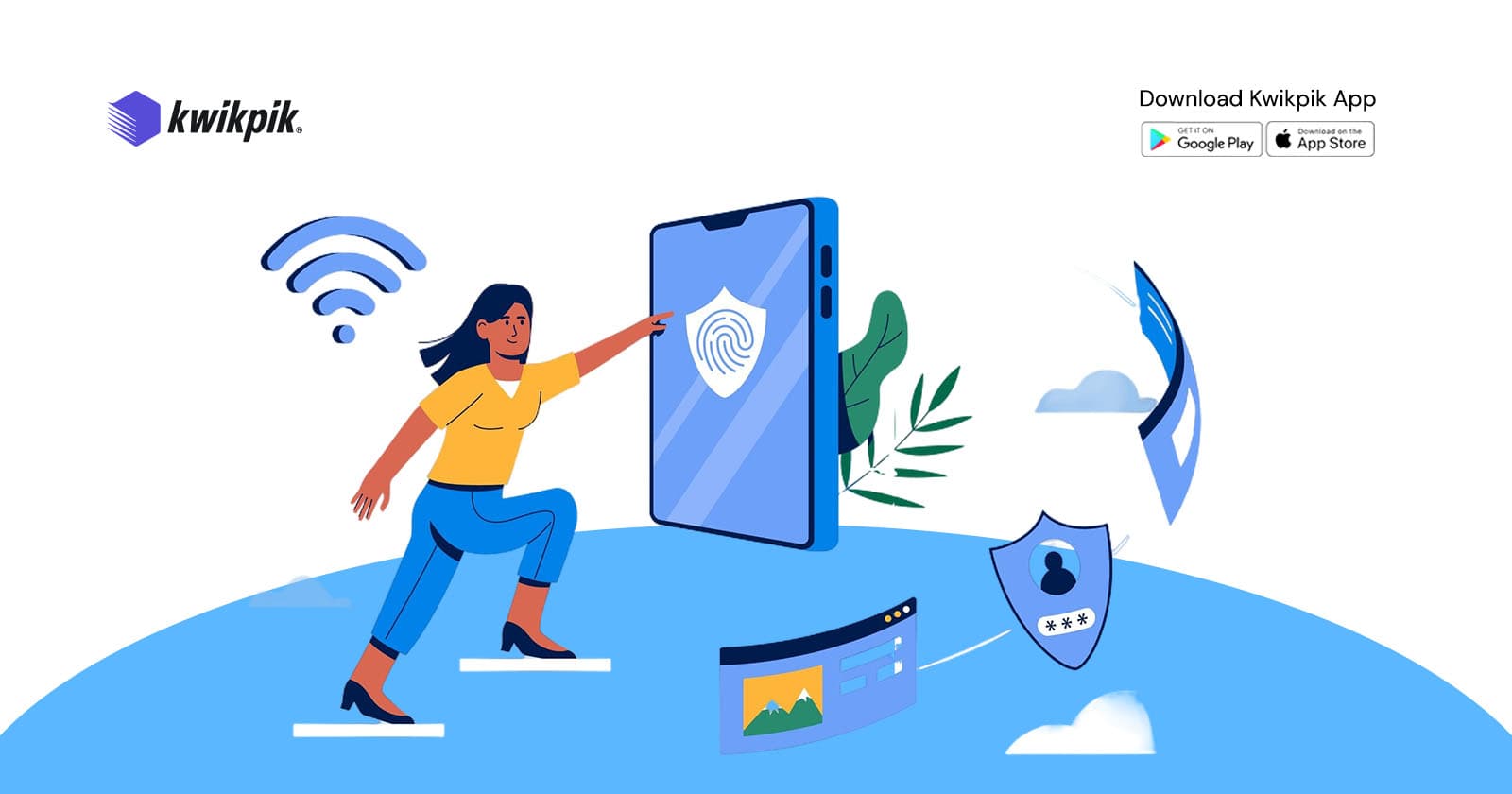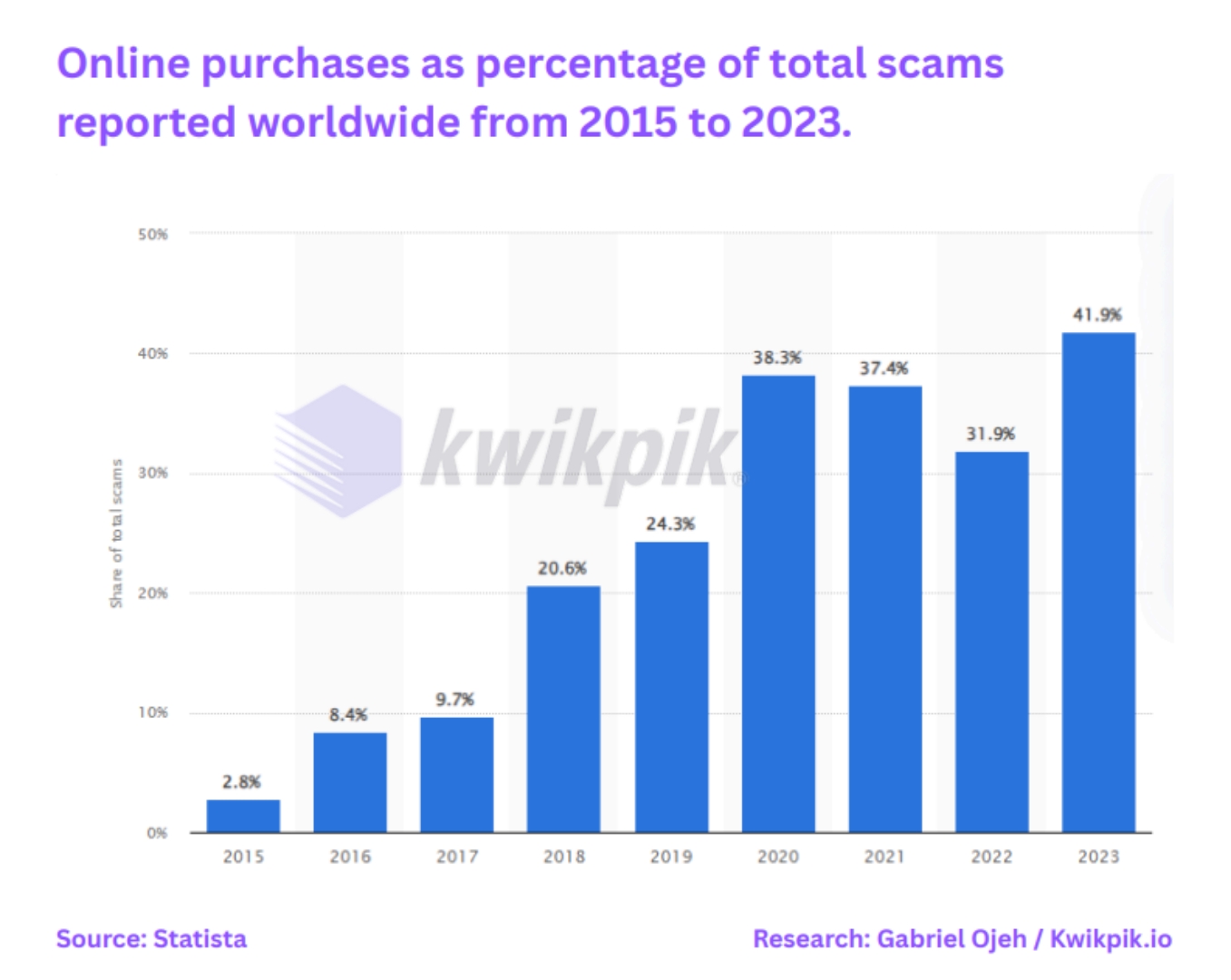
7 Tips to Safeguard Yourself from Online Delivery Scams
7 mins read
The rise of online shopping and food delivery services has brought convenience to our fingertips, but it has also opened the door to a new wave of scams targeting unsuspecting consumers.
Online scams are deceptive practices carried out online, aiming to trick individuals into revealing personal information or financial details. These scams can take many forms, including phishing emails, fake websites, and fraudulent delivery notifications.
According to reports from Statista, online scams have grown so much making it a bit difficult not to fall into one. From 2015 to 2023, the rise of online scams increased from 2.8% to a staggering 41.9%. This represents a 1396.43% increase, which is very alarming.

Phishing was one of the most reported cybercrimes, highlighting the need for awareness. As online shopping continues to grow, so does the risk of falling victim to these scams.
In this article, we'll explore the types of online scams, four ways scammers operate, seven essential tips to help you safeguard yourself from online delivery scams, and how you can protect your hard-earned money.
Types of Online Scams
Online scams can take various forms, each targeting different vulnerabilities:
Phishing: This is one of the most common types of online scams. Scammers impersonate trusted entities, such as banks or government agencies, through emails or messages that appear legitimate. They often ask recipients to click on links that lead to fake websites designed to steal login credentials or personal information.
Romance Scams: Scammers create fake profiles on dating sites or social media platforms to exploit emotional connections. They often build trust over time before asking for money, claiming emergencies, or travel expenses.
Online Shopping Scams: Fraudulent online marketplaces may sell counterfeit or non-existent products. Victims often realize they've been scammed only after making a payment and receiving nothing in return.
Investment Scams: These scams promise high returns with little risk, often promoting fake investment opportunities in stocks, real estate, or cryptocurrencies. Scammers may use highly developed marketing tactics to lure victims into investing their money.
Job Scams: Scammers post fake job listings to attract job seekers. They may ask for personal information or upfront fees for training or equipment, leaving victims with nothing but disappointment.
Holiday Scams: During peak travel seasons, scammers target individuals looking for vacation deals, offering fake accommodations or travel packages that do not exist.
Tech Support Scams: Scammers pose as technical support representatives, claiming to fix issues with your computer or device. They may ask for remote access or payment for unnecessary services.
4 Ways on How Scammers Operate
Scammers often use social engineering tactics to manipulate their victims. They may create a sense of urgency, making victims feel they must act quickly to avoid negative consequences. Common tactics include:
Urgency: Scammers create pressure by claiming that immediate action is required, such as confirming account details or claiming a prize.
Too Good to Be True Offers: If an offer seems excessively generous or unrealistic, it likely is a scam.
Impersonation: Scammers may impersonate friends, family, or trusted organizations to gain trust and solicit sensitive information.
Fake Websites: Many scams involve creating websites that closely resemble legitimate businesses, tricking users into entering their personal information.
Also Read:
7 Tips to Avoid Online Delivery Scams
To help you shop safely online, here are seven essential tips to safeguard yourself from online delivery scams:
#1 - Be Wary of Unexpected Delivery Notifications
Scammers often send fake delivery notifications via email or text, urging you to click on links to "update your delivery." Fraudsters often use phishing or smishing scams to trick you into revealing sensitive information. If you receive an unexpected email or text message claiming to be from a delivery company, do not click on any links or attachments.
Always verify these notifications by contacting the delivery service directly through their official website or customer service number. For example, if you receive a message from a delivery company, look up their contact information online and call them directly to confirm the legitimacy of the message. This simple step can save you from falling into a scammer's trap.
#2 - Enable Two-Factor Authentication
Protect your online accounts by enabling two-factor or multi-factor authentication. This extra layer of security can prevent unauthorized access to your accounts, even if your password is compromised. Enabling Two-Factor Authentication is a simple yet effective way to enhance your online security. By requiring both a password and a second form of verification, you can significantly reduce the risk of unauthorized access to your accounts. Make it a priority to enable 2FA on all your important online services, including banking, social media, and email accounts. This proactive measure will help protect your personal information and provide peace of mind in an increasingly digital world.
#3 - Monitor Your Accounts Regularly
Regularly check your bank and credit card statements for any unauthorized transactions. Setting up alerts for transactions can help you quickly identify and respond to suspicious activity. For example, if a charge from an unknown source appears, you can take immediate action by contacting your bank or credit card company. Being proactive about monitoring your accounts can help you catch potential fraud before it escalates.
#4 - Use Secure Payment Methods
Opt for secure payment methods, such as credit cards, which offer better fraud protection compared to debit cards. Credit cards often come with additional security features that can help you dispute unauthorized charges. Furthermore, using services like PayPal or Stripe can add an extra layer of protection, as it doesn’t require you to enter your card details directly on the seller's site. This way, your financial information remains secure even if the seller is not trustworthy.
#5 - Check the Website URL
When shopping online, always check the website URL for misspellings or unusual domain names. Scammers often create fake websites that closely resemble legitimate ones. Ensure the website is secure, indicated by "https://" at the beginning of the URL. A classic example of this is a site that may appear as "www.amazon-secure.com" instead of "www.amazon.com." Always double-check before making any transactions, as even a small typo can lead you to a fraudulent site.
#6 - Educate Yourself on Common Scams
Stay informed about the latest scams and tactics used by fraudsters. Knowledge is your best defense. Familiarize yourself with common signs of scams, such as urgent requests for payment or personal information. Websites like the FTC and consumer protection agencies provide updated information on prevalent scams, helping consumers recognize and avoid them. Additionally, consider following cybersecurity blogs or forums to stay updated on emerging threats.
#7 - Report Suspicious Activity
If you suspect that you have been a victim of a delivery scam, report the incident to your bank, the delivery company, and any other relevant authorities. This helps them identify patterns of fraudulent activity and take appropriate action to protect other consumers. For instance, if you receive a phishing email that impersonates a delivery service, reporting it can help prevent others from being scammed. Your vigilance can contribute to a safer online environment for everyone.
Bonus
#8 - Use Secure Tracking Options
When shopping online or using delivery services, look for companies that offer secure and real-time tracking options. This allows you to verify the progress of your deliveries directly from the company's website, reducing the risk of falling for fake delivery notifications. Choosing a secure tracking option is vital for protecting yourself from online delivery scams and ensuring a smooth shopping experience. Always prioritize services that offer transparency and reliability to build trust in your online transactions.
Conclusion
Online delivery scams are a growing threat, but by following these tips and staying vigilant, you can significantly reduce your risk of becoming a victim. Remember, the key to staying safe is to be skeptical of unexpected messages, verify the authenticity of any communication, and use secure tracking options whenever possible. By taking these precautions, you can enjoy the convenience of online shopping and delivery services while protecting your personal and financial information.
Why Use Kwikpik for Your Online Delivery?
Kwikpik is a leading Delivery-as-a-Service (DaaS) provider in Nigeria, offering end-to-end logistics solutions for businesses and individuals. With our user-friendly app, you can easily manage deliveries and track your packages in real time.
Some key features of Kwikpik include:
Same-day and next-day delivery options.
Affordable pricing without hidden costs.
Delivery to remote areas across Nigeria.
Insurance and packaging services to secure your deliveries.
To learn more about how Kwikpik can help you with your online deliveries, visit our website.
Download our app| Become a rider| Become a business partner| Visit our social channels


